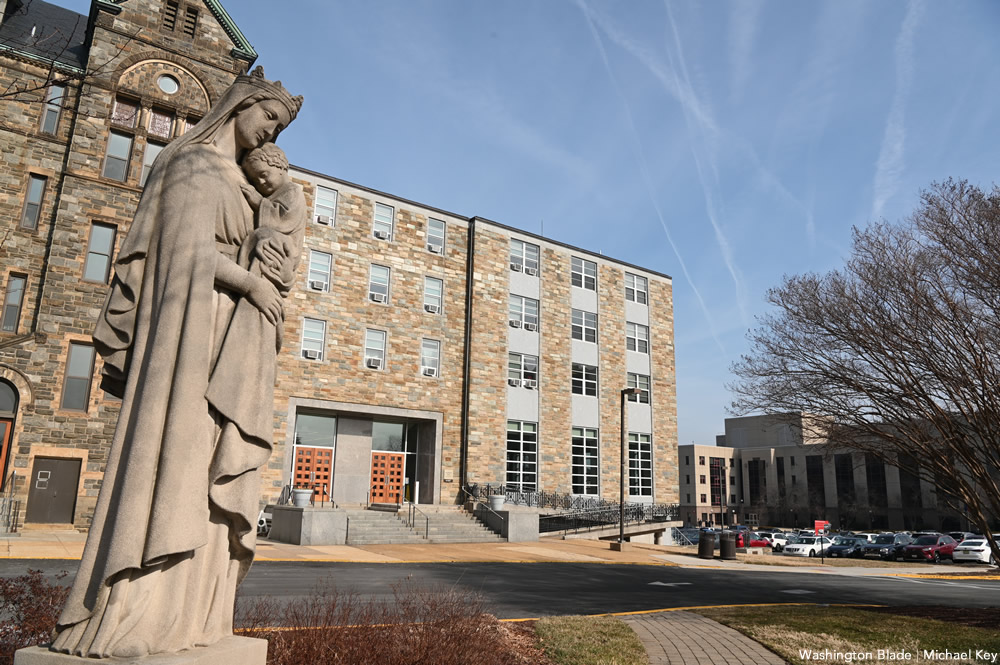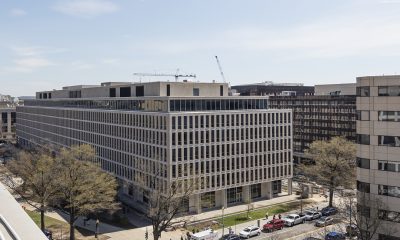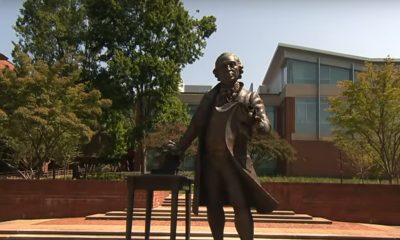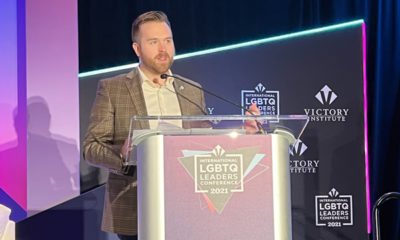Local
Catholic University LGBTQ student group remains unrecognized
CUAllies formed in 2009

The only on-campus queer student organization at the Catholic University of America, CUAllies, is still fighting for official recognition.
Despite operating “underground,” the club’s roughly 10 members meet regularly to talk about issues facing LGBTQ college students, to create friendships and to connect LGBTQ students and allies with one another. Since the formation of CUAllies in 2009, the administration at Catholic University, most notably President John Garvey, has denied the club official recognition multiple times.
“Just the act of having the university recognize us would be a huge step because it would make people feel way more welcome,” said CUAllies President Ash Samuels. “The nature of having a club that operates under the radar makes you feel like they have to operate under the radar and so just being recognized would make people feel a lot more welcome.”
Additionally, without recognition CUAllies does not have access to the same resources as official student organizations. For example, they cannot rent rooms on campus for meetings, receive funding for events, and are prohibited from advertising club meetings or events on fliers on campus. According to Samuels, the club uses space at the Center for Cultural Engagement, where Director Javier Bustamante allows the club to meet and advertise events.
According to Samuels, CUAllies has been advised by the Dean’s Office to wait until next year to reapply when a new university president will replace Garvey. Until then, Samuels said the group still plans to hold meetings in-person, and he hopes to bring in speakers to talk to members about mental health and issues facing LGBTQ college students.
The last attempt by CUAllies to gain recognition was in March 2021, when the Catholic University’s Student Government Association passed a resolution after hours of public comment from students to support a resolution for the club to request official status. The request, however, was denied by Garvey.
“It was an interesting SGA meeting,” said Samuels. “A lot of people came to public comment and spoke their minds. There was a lot of homophobia.”
Catholic University is one of the 180 campuses deemed unsafe for LGBTQ youth on Campus Pride’s “Worst List.” Campus Pride, an organization that advocates for safe and inclusive college campuses for LGBTQ students, stated on their website that “Catholic University of America has qualified for the Worst Life because it has an extensive and well-documented history of anti-LGBTQ discrimination.”
In addition to repeatedly depriving LGBTQ students of the right to have an official student club, the university has also displayed its homophobic ideology by filing an amicus brief in the 2019 U.S. Supreme Court case Bostock v. Clayton County. In the brief, the university argued that the campuses should be allowed to discriminate based on sexual orientation or gender identity under the Civil Rights Act of 1964.
“This campus has repeatedly proven that they do not support LGBTQ rights, LGBTQ equality,” said Campus Pride Executive Director Shane Windmeyer.
A 2021 survey by the Religious Exemption Accountability Project, an organization that promotes equity for LGBTQ college students at Christian colleges, said that students at Christian colleges are 15 times more likely to report that their gender or sexual identity has prevented them from being accepted by others on campus compared to LGBTQ students at non-Christian colleges.
The pandemic has increased this sense of isolation, as students were forced to attend classes online and did not have access to the same social networks that were once offered in person on many campuses. Although mental health struggles have increased overall for college students overall throughout the pandemic, research has shown that LGBTQ individuals were more likely to have struggled with depression, anxiety, or suicidal thoughts than people identifying as straight.
Attending a university that already has limited resources for its LGBTQ student population, combined with the isolating effects of the pandemic, makes the Catholic University increasingly worrisome for LGBTQ students from a mental health perspective.
“It is a pretty awful environment from the standpoint of mental health if your campus did not have inclusion or had limited inclusion for LGBTQ policies, programs, or practices before the pandemic, the pandemic has only worsened that because of the isolation that these students feel,” said Windmeyer.
Samuels said that CUAllies has served as an important place for students at the Catholic University to meet other queer students, with many members making their first contact with other LGBTQ students through the club. However, Samuels said that operating remotely during the pandemic made it difficult to feel the same level of connection, despite the fact that the group was still meeting routinely over Zoom.
“The feeling of isolation is amplified for LGBTQ students, especially on this campus,” said Samuels. “You might not have friends who you are out to or you might not have friends at all. If you don’t have [club meetings] in person in order to make those connections, and you are already isolated, it makes it a lot harder.”
Despite not having an officially recognized LGBTQ student organization, the Catholic University offers groups orientated towards LGBTQ students through its Counseling Center and Campus Ministry.
The Counseling Center runs a weekly therapy group called MOSAIC, which “provides an environment where LGBT-identified and straight students can come together to learn about available resources, discuss various topics related to personal wellness, and build a supportive network with other students,” according to the Counseling Center’s webpage.
Samuels, who is an active participant in MOSAIC, said that both the therapy group and the Counseling Center are “very LGBTQ+ friendly.” Samuels said he routinely encourages members of CUAllies to get connected with the Counseling Center during club meetings.
According to Samuels, therapists at the Counseling Center have told him that they often get students who identify as LGBTQ, but are hesitant to join CUAllies because they are perceived as being “too liberal or not Catholic enough” despite the organization not having any political or religious affiliation and being welcoming to people of all backgrounds.
Additionally, Catholic University’s Campus Ministry offers a faith group called ‘Beyond the Labels’ which defines itself as a ministry for LGBTQ students “to support each other in their Catholic Christian life by forming holistic friendships,” according to Campus Ministry’s website.
The group was formed last fall by Father Jude DeAngelo, director of Campus Ministry.
“Because we are a Catholic school I think there is a population of students who are trying to integrate their faith with all the different labels that they have either chosen or that people put on them,” said DeAngelo to the Washington Blade. “I just want to have a place where students can come and they can be themselves and they can talk about their faith and their struggles to be Catholic Christians.”
On “Beyond the Labels,” Samuels said, “I think [DeAngelo] has the right intentions, but it still has that risk that people could turn it into a negative thing or misconstrued his words.”
Samuels said that leadership at CUAllies has expressed their concerns to the Counseling Center that “Beyond the Labels” could be potentially harmful towards LGBTQ students. Samuels said that he encourages people who are in need to seek out the Counseling Center first.
DeAngelo did not offer a comment to the Blade on whether he believed CUAllies should be officially recognized by the university, however, according to Samuels, DeAngelo has been an advocate for CUAllies to be officially recognized by the university.
Windmeyer said what the Catholic University has done with its ministry has been replicated at other campuses with harmful policies against LGBTQ students as a push to better their public image.
He said that these colleges try to, “create a narrative that shows that [they] are compassionate, that [they] recognize, underneath our ministry, our LGBTQ group, but [they] are not going to recognize them as student organizations, they have to do it through the ministry. That in itself is just telling me that they are just doing enough to pacify their students, they do not see Catholicism as giving LGBTQ people the human dignity and worth that they deserve.”
Windmeyer noted that other Catholic Universities, such as the University of Notre Dame — which has an official LGBTQ student organization — have made improvements throughout the years to be more inclusive of their LGBTQ student population.
The Catholic Church’s stance on LGBTQ-related issues has improved as well. Last year Pope Francis stated that he endorsed civil unions. However, despite these advancements, activists in conversation with the Blade have remarked church teachings on homosexuality and gender identity remain largely unchanged.
Samuels said that he hopes that the LGBTQ faith group run by DeAngelo will be a step to help the university advocate for CUAllies to become recognized. DeAngelo expressed that he is interested in getting more members of CUAllies involved with “Beyond the Labels,” specifically, he said wants to create joint day-retreat programs with the club.
In the past, “Beyond the Labels” partnered with CUAllies on a day retreat focused on forgiveness. Samuels, who was not a member of CUAllies during the forgiveness retreat, said that he would be more interested in partnering on a team-building retreat instead of focusing on forgiveness because many of CUAllies members are not Catholic.
“I am hopeful that it will lead him to be a larger advocate for us to be a club in the future, but I do also worry that they will just say ‘oh look we already have this program we don’t need you guys,’” said Samuels.
Catholic University did not return the Blade’s request for comment for this story.
District of Columbia
Gay ANC member announces candidacy for Ward 1 D.C. Council seat
Community leader Brian Footer seeking seat held by Brianne Nadeau

Gay Advisory Neighborhood Commissioner Brian Footer, a community activist who has been involved for many years in local and national government affairs, has announced his candidacy for the Ward 1 D.C. Council seat up for election in 2026.
Footer, a Democrat, will be running in the city’s June 2, 2026, Democratic primary for the Ward 1 Council seat, but it is uncertain whether he will be running against incumbent Ward 1 Council member Brianne Nadeau (D). Nadeau has not yet announced if she plans to run for re-election for a fourth term following her 12 years on the Council.
Nadeau has been a longtime vocal supporter of the LGBTQ community.
If Footer were to win the primary and the November 2026 general election, he would become the Council’s second openly gay member. Ward 5 Council member Zachary Parker (D) is currently the 13-member Council’s only gay member.
Footer is a three-term ANC commissioner who currently serves as Chair of ANC 1E, which represents the city’s Adams Morgan neighborhood.
“Brian has worked at every level of government — federal, state, and local — building a career rooted in public service, aging policy, and inclusive urban planning,” a statement on his campaign website says.
“I’m running for Council because too many people in Ward 1 are doing everything right and still feel ignored by the city they call home,” Footer states on his website.
“I’m running because we can do better,” his statement continues. “That means making housing more affordable, addressing homelessness with real solutions, and keeping our neighborhoods safe with smart, community focused strategies.”
When contacted by the Washington Blade for comment, Nadeau said she was not ready at this time to discuss her plans about running again or about Footer’s candidacy.
“The primary is a ways away, and I’m very focused right now on the budget and the stadium deal and all the work that we’re doing at the Council,” she told the Blade. “So, I really haven’t had time to turn to my plans. So, as a result, I’m also not going to be commenting on anybody else who is determined that they’re running at this time.”
She first won election to the Council in 2014 after she defeated four-term gay Ward 1 Council member Jim Graham in the Democratic primary after Graham became embroiled in an ethics controversy.
In the 2022 Democratic primary Nadeau defeated gay challenger Salah Czapary in a three-candidate race, by a margin of 48.5% of the vote compared to Czapary’s 30.9%.
With the third candidate, Sabel Harris, receiving 20.4%, the outcome showed that the two challengers had a combined total vote count higher than Nadeau.
Further details of Footer’s candidacy can be accessed from his campaign website, brianfooterdc.com.
District of Columbia
Gay GOP group hosts Ernst, 3 House members — all of whom oppose Equality Act
Log Cabin, congressional guest speakers mum on June 25 event

U.S. Sen. Joni Ernst (R-Iowa) and three women Republican members of the U.S. House appeared as guest speakers at the June 25 meeting of Log Cabin Republicans of D.C., the local chapter of the national LGBTQ Republican group with that same name.
The U.S. House members who joined Ernst as guest speakers at the Log Cabin meeting were Celeste Maloy (R-Utah), Kat Cammack (R-Fla.), and Julia Letlow (R-La.).
Neither D.C. Log Cabin Republicans President Andrew Minik nor spokespersons for Ernst or the three congresswomen immediately responded to a request by the Washington Blade for comment on the GOP lawmakers’ appearance at an LGBTQ GOP group’s meeting.
“Please join us for an inspiring evening as we celebrate and recognize the bold leadership and accomplishments of Republican women in Congress,” a D.C Log Cabin announcement sent to its members states.
“This month’s meeting will highlight the efforts of the Republican Women’s Caucus and explore key issues such as the Protection of Women and Girls In Sports Act and the broader fight to preserve women’s spaces in society,” the message says.
It was referring to legislation pending in Congress calling for banning transgender women from participating in women’s sports events.
According to media reports, Ernst and the three congresswomen have expressed opposition to the Equality Act, the longstanding bill pending in Congress calling for prohibiting discrimination based on sexual orientation and gender identity in the areas of employment, housing, and public accommodations.
The Log Cabin announcement says the meeting was scheduled to take place at the Royal Sands Social Club, which is a restaurant and bar at 26 N St., S.E. in the city’s Navy Yard area.
D.C. Log Cabin member Stuart West, who attended the meeting, confirmed that Ernst and the three congresswomen showed up and spoke at the event.
“It was a good turnout,” he said. “I would definitely say probably 30 or 40 people attended.” West added, “Four women came to talk to a group of mostly gay men. That’s something you don’t see very often.”
District of Columbia
D.C. police seek public’s help in July 5 murder of trans woman
Relative disputes initial decision not to list case as hate crime

D.C. police are seeking help from the public in their investigation into the murder of a transgender woman who they say was shot to death at about 12:30 a.m. on Saturday, July 5, on the 2000 block of Benning Road, N.E.
But the police announcement of the fatal shooting and a police report obtained by the Washington Blade do not identify the victim, 28-year-old Daquane ‘Dream’ Johnson of Northeast D.C., as transgender. And the police report says the shooting is not currently listed as a suspected hate crime.
It was local transgender activists and one of Johnson’s family members, her aunt, who confirmed she was transgender and said information they obtained indicates the killing could have been a hate crime.
“On Saturday, July 5, at approximately 12:51 a.m., Sixth District officers were flagged down in the 2000 block of Benning Road, Northeast, for an unconscious female,” a July 5 D.C. police statement says. “Upon arrival, officers located an adult female victim suffering from gunshot wounds,” it says.
“D.C. Fire and EMS responded to the scene and transported the victim to a local hospital where after all lifesaving efforts failed and the victim was pronounced dead,” the statement says.
A separate police flyer with a photo of Johnson announces an award of $25,000 was being offered for information leading to the arrest and conviction of the person or persons responsible for the murder.
The flyer identifies D.C. police Homicide Detective Natasha Kennedy as being the lead investigator in the case and says anyone with information about the case should contact her at 202-380-6198.
Longtime D.C. transgender rights advocate Earline Budd told the Blade that one of the police investigators contacted her about the case and that she also spoke to Detective Kennedy. Budd said police confirmed to her that Johnson was a transgender woman.

One of Johnson’s family members, Vanna Terrell, who identified herself as Johnson’s aunt, told the Blade that Johnson used the first name of Dream and had planned to legally adopt that name instead of Daquane but had not gotten around to doing so.
Terrell said she and other family members learned more about the incident when one of two teenage high school students who knew Johnson’s brother contacted a friend and told the friend that they recognized Johnson as they witnessed the shooting. Terrell said the friend then called her to tell her what the friend learned from the two witnesses.
According to Terrell, the witnesses reportedly saw three men approach Johnson as Johnson walked along Benning Road and one of them called Johnson a derogatory name, leading Terrell to believe the men recognized Johnson as a transgender woman.
Terrell said one of the witnesses told the friend, who spoke to Terrell, that the man who shot Johnson kept shooting her until all of the bullets were fired. Budd, who said she spoke to Terrell, who also told her what the witnesses reported, said she believed the multiple shots fired by the shooter was an “overkill” that appears to have been a hate crime. Terrell said she too believes the murder was a hate crime.
In response to an inquiry from the Blade, Officer Ebony Major, a D.C. police spokesperson, stated in an email, “At this point there is nothing in the investigation that indicates the offense was motivated by hate or bias.”
Terrell said a memorial gathering to honor Johnson’s life was scheduled to be held Saturday, July 12, at River Terrace Park, which is located at 500 36th St., N.E. not far from where the shooting occurred.

-

 Federal Government2 days ago
Federal Government2 days agoTreasury Department has a gay secretary but LGBTQ staff are under siege
-

 Virginia2 days ago
Virginia2 days agoDefying trends, new LGBTQ center opens in rural Winchester, Va.
-

 District of Columbia1 day ago
District of Columbia1 day agoGay GOP group hosts Ernst, 3 House members — all of whom oppose Equality Act
-

 Opinions3 days ago
Opinions3 days agoUSAID’s demise: America’s global betrayal of trust with LGBTQ people












